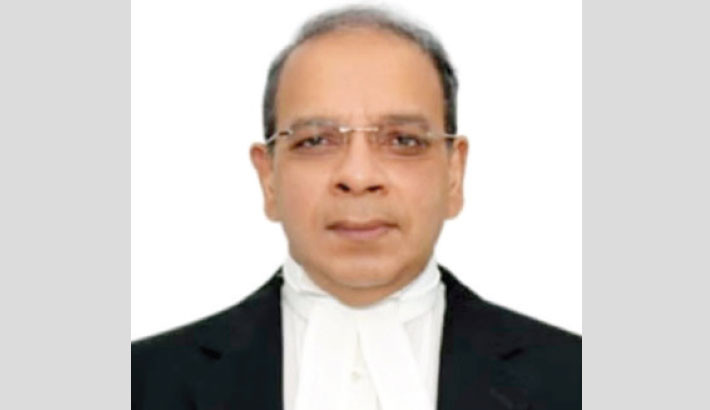Print: 29 Oct 2025
Chief Justice Syed Refaat Ahmed on Tuesday emphasised that the judiciary must serve as the foundation for all other sectoral reforms in any transition from an unjust and dictatorial regime to a stable, peaceful, and prosperous democracy.
“Far-reaching and transformative reforms of the judiciary must underpin all other sectoral reforms during such transitions. As the guardian of constitutionality, legality, and human rights compliance in all reform efforts, the judiciary must first free itself from authoritarian influence and evolve into an independent and trusted arbiter, providing effective remedies for all who seek justice before our courts,” he stated in a video message for the 2025 Annual Meeting on the Rule of Law and Human Rights Opening Panel, held in New York.
Justice Refaat noted that upon assuming office, he inherited a backlog of over 4.2 million cases and a judiciary plagued by deep-rooted public distrust, stemming from persistent political instrumentalisation.
Reflecting on the spirit of the July uprisings, he said: “Since taking office as Chief Justice of Bangladesh, the legacy of those young men and women who paid the ultimate price during the protests has inspired my mission and steeled my resolve to restore equity and justice through a transformative judicial reform agenda.”
He further remarked, “Our work in Bangladesh over the past nine months serves as a prime example of the central role of rule of law reforms in nations undergoing transition, as well as of the UN’s – particularly UNDP’s – capacity to effectively support profound and wide-ranging justice reforms, drawing on its extensive and specialised expertise, and its agility in scaling, deploying, and tailoring support to enable transformative change.”
He acknowledged the UNDP’s assistance in implementing reforms, including technical expertise on alignment with international standards and norms, and guidance on integrity, digital transformation, people-centred approaches, and public outreach.
“Bangladesh must stand as a beacon of hope in the transition to a better future. Our unwavering pursuit of justice reform amidst volatile and challenging circumstances must remain a pillar of hope for all Bangladeshi men and women, affirming that the promise of fundamental reforms for a peaceful, stable, more equitable, and prosperous future is being honoured. When justice is absent, it is often demanded in the streets. Restoring justice is the path to peace, stability, and the advancement of human rights,” he concluded.
More From Metropolis
More From Metropolis
Judiciary must be the foundation for other sectoral reforms
Says CJ as he addresses Rule of Law and Human Rights opening panel in New York

Chief Justice Syed Refaat Ahmed on Tuesday emphasised that the judiciary must serve as the foundation for all other sectoral reforms in any transition from an unjust and dictatorial regime to a stable, peaceful, and prosperous democracy.
“Far-reaching and transformative reforms of the judiciary must underpin all other sectoral reforms during such transitions. As the guardian of constitutionality, legality, and human rights compliance in all reform efforts, the judiciary must first free itself from authoritarian influence and evolve into an independent and trusted arbiter, providing effective remedies for all who seek justice before our courts,” he stated in a video message for the 2025 Annual Meeting on the Rule of Law and Human Rights Opening Panel, held in New York.
Justice Refaat noted that upon assuming office, he inherited a backlog of over 4.2 million cases and a judiciary plagued by deep-rooted public distrust, stemming from persistent political instrumentalisation.
Reflecting on the spirit of the July uprisings, he said: “Since taking office as Chief Justice of Bangladesh, the legacy of those young men and women who paid the ultimate price during the protests has inspired my mission and steeled my resolve to restore equity and justice through a transformative judicial reform agenda.”
He further remarked, “Our work in Bangladesh over the past nine months serves as a prime example of the central role of rule of law reforms in nations undergoing transition, as well as of the UN’s – particularly UNDP’s – capacity to effectively support profound and wide-ranging justice reforms, drawing on its extensive and specialised expertise, and its agility in scaling, deploying, and tailoring support to enable transformative change.”
He acknowledged the UNDP’s assistance in implementing reforms, including technical expertise on alignment with international standards and norms, and guidance on integrity, digital transformation, people-centred approaches, and public outreach.
“Bangladesh must stand as a beacon of hope in the transition to a better future. Our unwavering pursuit of justice reform amidst volatile and challenging circumstances must remain a pillar of hope for all Bangladeshi men and women, affirming that the promise of fundamental reforms for a peaceful, stable, more equitable, and prosperous future is being honoured. When justice is absent, it is often demanded in the streets. Restoring justice is the path to peace, stability, and the advancement of human rights,” he concluded.





